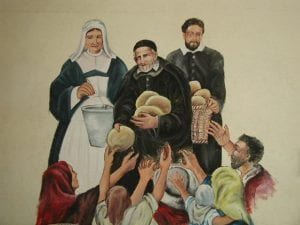Written by: Tom Judge, Assistant Director and Chaplain, Faculty and Staff Engagement, Division of Mission and Ministry
Recently, it occurred to me that I have been spending much of my time during autumn 2024 in one of three ways. The first is the most typical: trying to keep up with the rapid pace of fall quarter at DePaul, with programs, Zoom meetings, deadlines, and emails following one after the other in a familiar cycle. The second is the most sublime: relishing the sunshine, mild temperatures, and beautiful colors we’ve experienced during this past month. Has there ever been, in recent memory at least, such an uninterrupted string of easy autumn days in Chicago? The third way I’ve been spending my time this fall is the way I like the least. It is unwelcome and worrisome. Lately, like many, I’ve been spending a lot of my bandwidth feeling anxious about the upcoming election. While reading the news and talking with friends, but mostly when I’m alone, I am distressed over our current circumstances. I ruminate over questions like, what are the latest headlines and poll numbers? What will happen if my candidates lose? Is there more I should be doing? And how did we, as a society, even get to this place?
Sometimes, after sitting with these thoughts and feelings for too long, I try to open my heart to God and ask for a little relief and guidance. I may even seek out a wisdom figure, someone who is likely to have a helpful insight or has made it through similar challenges before. That is what led me, several evenings ago, to Frédéric Ozanam (1813–1853). Ozanam is a member of the Vincentian Family, less well-known than Vincent de Paul and Louise de Marillac, but his legacy as a brilliant scholar and prophetic voice of charity and justice during a time of unrest makes him relevant to this moment.
In a short but eventful life, Ozanam was a lawyer, professor, and journalist as well as a devoted son, husband, and father. Formed by the Catholic faith, at a young age he and some friends founded a charitable organization based on Christian principles that engaged with the poor of Paris. The group became known as the Society of St. Vincent de Paul after they adopted the patron saint of charity as their model and inspiration. Now, over 170 years since it began, the Society of St. Vincent de Paul has almost one million members who provide service to those most in need throughout the world. [1]
In a time of rising class struggles and agitation for reform, Ozanam did not advocate for charity alone. He also called out for justice. He declared that “the order of society is based on two virtues: justice and charity,” and he linked these imperatives with his faith through the use of a familiar Gospel parable. Ozanam wrote, “Charity is the Samaritan who pours oil on the wounds of the traveler who has been attacked. It is justice’s role to prevent the attacks.” [2] Ozanam believed in a society based on the common good; advocating for the sacrifice of each for the advantage of all. During the Industrial Revolution, when urban poverty and harsh working conditions became more widespread and visible, he began to develop arguments in favor of basic rights like a natural (or living) wage, labor unions, and social security. In making these arguments, and grounding them in the teachings of Christ, Ozanam helped nourish the ideas that grew into the corpus of Catholic Social Teaching. Ozanam believed in a society whose end is love. And, he saw democracy, infused with the ideals of liberty, inclusion, equality, and human dignity, as the best form of government to achieve this end.
Of course, Ozanam’s call for reform attracted fierce resistance from the elite throughout France as well as within the Church. He knew this. However, true to his faith, Ozanam gently encouraged those who agreed with him to learn to defend their convictions without hating their adversaries. “All my life,” he wrote, “I have followed the poetry of love in preference to the poetry of anger. I will not change now.” [3]
I take heart from the life and wisdom of Frédéric Ozanam. I believe in his vision of a society where charity, justice, and human dignity are valued above all else, and democracy as a form of government is honored and upheld. I am mindful that he was active during a time of great human progress but also tremendous change, conflict, and social pressure. As this election season draws towards its culmination, I hold Ozanam’s example close. Undoubtedly, he experienced personal struggles and lived through widespread unrest. Yet he persevered. In fact, his faith and his commitment to charity and justice seemed only to grow stronger as his eventful, impactful, yet all-too-brief, life unfolded. In its wake is a legacy that informs and inspires even to this day.
Invitation for Reflection:
How is your spirit as we draw closer to Election Day? Can you draw any inspiration or insight from our Vincentian mission and heritage?
Consider Ozanam’s twin imperatives: charity and justice. How do these resonate with you? How are you devoting your time, energy, or resources toward them?
Reflection by: Tom Judge, Assistant Director and Chaplain, Faculty and Staff Engagement, Division of Mission and Ministry
[1] “About Us,” International Confederation of the Society of St. Vincent de Paul, https://www.ssvpglobal.org/about-us/.
[2] “Frédéric Ozanam Quotes,” The Vincentian Formation Network, accessed October 23, 2024, https://vincentians.com/en/quotes-collection/frederic-ozanam-quotes/.
[3] Ibid.

